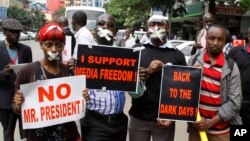A new report says Kenyan authorities have used threats, beatings and phone tapping to intimidate journalists reporting on sensitive issues.
The report, titled "Not Worth the Risk," details abuses in Kenya since 2013 that Human Rights Watch and media advocacy group Article 19 say have made it dangerous for journalists to report on controversial issues like corruption, land rights and alleged human rights violations by security services.
Otsieno Namwaya, a Human Rights Watch researcher, detailed some of the issues Kenyan journalists face.
"The government has attempted to obstruct critical journalists using legal, administrative and informal measures which include threats, intimidation, harassment online and phone surveillance, which is really a big problem right now. Most journalists are worried they are being monitored, phones tapped," Namwaya said.
The rights group says it has documented 17 cases in which 23 journalists and bloggers were attacked. At least two journalists died have been killed since 2013 while doing their jobs.
VOA spoke to journalist Isaiah Gwenji, who says he was arrested in March and beaten for four hours at a police camp in western Kenya.
"They were arresting me because of previous stories that I have been doing which they claimed were painting them in bad image," Gwenji said, "like there were incidences where people being tortured by the same officers and we also had evidence of people who had been beaten by these officers, and I was simply doing stories highlighting the violation of rights of these people."
Government spokesman Eric Kiraithe refutes the allegations in the report. He says the government is not working to silence journalists.
"There might be individual cases of private conflict between one individual and the other, but the issue of systemic of muzzling journalists by the state, they are just not there," Kiraithe said. "The government is not doing that."
Henry Maina is the head of the East Africa office of Article 19, a global nongovernmental organization that promotes freedom of expression and information. With campaigning under way in these hotly contested polls, Maina says Kenya needs a free press now more than ever.
"You are likely electing people who you knew nothing about," Maina said. "You are likely to end up having people react to misinformation that may be inciteful. [They] may say things didn't work well, yet, in reality, they may have worked well. So it's … critical in a moment of electioneering that credible professional media exists."
With the vote less than three months away, HRW and Article 19 are calling on Kenyan authorities to send a clear message, and to investigate and prosecute threats against journalists.




